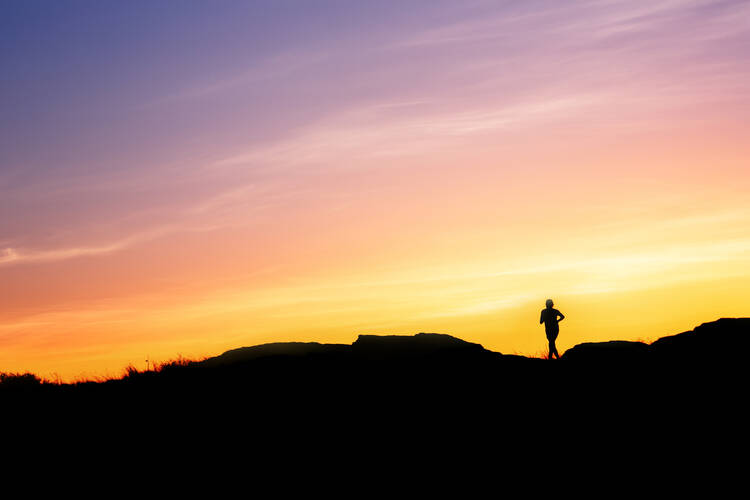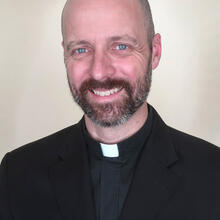It is 6:45 a.m. and pitch dark in Milwaukee. I sit up in bed and scowl at my buzzing alarm clock. I can hear the wind whistling outside my window. It’s probably 15 degrees Fahrenheit outside. It might warm up to 20 later. Maybe.
I can’t help but think: Why am I doing this?
Two weeks prior, I had signed up for a 5K race, the equivalent of 3.1 miles. It seemed like a good idea at the time. The race starts at 8 a.m. With luck and grace (and a tailwind), I’ll finish at 8:22 a.m. First I need to drive to the city park, get my bib number at the registration table, and wait with 500 other shivering runners at the starting line as the sun peeks over the dark horizon. We’ll bounce, hop and jog in place to keep our blood from congealing in our veins like cold maple syrup. Over the loudspeaker, we’ll hear: “Ready? On your marks. Get set....”
I roll out of bed and down the stairs to shove a granola bar in my mouth and slurp down a cup of coffee. Stumbling back upstairs, I pull on a hoodie and fumble with the laces on my running shoes. I glance again at the clock. 7:05 a.m. Dang. I’ve got to go. Where did I put my gloves? And why am I doing this?
Running is the oldest and simplest sport in the world. “Let’s race. Ready? Go!” All you need is a pair of shoes. It is a common metaphor for both our spiritual and earthly lives. St. Paul writes, “I have competed well; I have finished the race; I have kept the faith” (2 Tim 4:7). Note that he didn’t say he won the race. He ran and finished. He didn’t quit. He gave it his best shot, with God’s grace.
St. Paul writes, “I have competed well; I have finished the race; I have kept the faith” (2 Tim 4:7). Note that he didn’t say he won the race. He ran and finished.
Running is about urgency. “As the soldier stepped off the plane, his wife ran to meet him.” Mary Magdalene sees the empty tomb and runs to tell the disciples. Then Peter and John run to the tomb to see for themselves. John adds this detail: “The other disciple ran faster than Peter and arrived at the tomb first” (20:4). “We raced. I won,” John tells us—humbly, of course.
I have been running for half my life—23 of my 46 years. I ran on the track team at my Jesuit high school. These days I typically do 10 to 20 miles per week. In my 5K race, I hope to beat most of the other guys in their 40s—humbly, of course. The 25 year-old guys and gals will fly past me; when I gasp across the finish line, they will already be chomping on their bananas and gummy bears (odd, standard after-race snacks).
At the starting line, I look around nonchalantly at the other competitors. He looks fast. He doesn’t. She looks really fast. We all realize how crazy this is. We’re still bouncing, nervous, excited, joking on the black pavement. “I should’ve brought a thermos of coffee with me!” “Or Jack Daniels!” Smiles, laughter, more bouncing, setting our watches to keep track of time and pace. We have been training for this. We want to give it our best shot—even if no one else cares how fast we’ll run. At dinner I’ll tell an older Jesuit about my race. “Wow, 22 minutes. Is that good?” he asks. It’s good for me.
Lessons from the road
My gains from running are not purely physical. I find that the discipline it requires helps me in my spiritual life, too. I will not get any faster sitting in my chair watching Netflix. I am not going to get holier or more compassionate by eating another bag of Cheetos (I enjoy my Netflix with Cheetos).
I may not feel like praying every day. I certainly don’t feel like running every day. The fruits of each occur in the moment and afterwards.
Similarly, prayer is a gift and a commitment. I may not feel like praying every day. I certainly don’t feel like running every day. The fruits of each occur in the moment and afterwards. I feel good that I feel tired after a long run. I appreciate the slow, steady expansion of my heart that God brings after days and months of prayer. I do feel better; more peaceful, more aware of God’s action and the people around me.
And the Holy Spirit provides just enough glory to keep us going again and again. A children’s choir and the scent of pine at Christmas eve Mass. The sun setting as I run along the Milwaukee river on a crisp October evening. These graces mingle with the quiet joys of a rosary prayed along a country road, or a silent moment in eucharistic adoration in a parish chapel.
Over the years I’ve gleaned some advice from my running that applies to my prayer life, too:
Do something. Say a prayer. Go for a walk. It’s O.K. to start small. If you don’t start, you won’t go anywhere.
Bring a pal. I usually run alone. I enjoy the time for quiet and reflection. Sometimes I run with Sara. She and I were in grad school at Boston College a few years ago and have remained friends. Or I run with Ryan, a dad 10 years younger and quicker than me. He runs slow and I run fast when we go together. Having a friend on the journey makes it more fun. Similarly, it often helps to pray in community. Go to Mass or invite a friend to say a rosary.
If I wait for the perfect day, I’ll wait a long time. It’s windy. I’m too busy. In the spiritual life, too, we can just say, “I don’t feel like doing this today,” and then do it anyway.
Results don’t come instantly. My training doesn’t make me instantly faster. But I might see some results next week. Similarly, if I am stressed today and pray about this, I may feel a little less stressed. If I continue praying, I will certainly be less stressed and more centered in the Lord in seven days.
Eat something. The heart is a muscle, an engine. It needs fuel to exercise and to love. That is why Jesus gives us the Eucharist. His body and blood are food for the spiritual life. A runner who doesn’t eat will cramp and collapse before the finish line. Read a chapter of the Gospels. Listen to a religious podcast. To give, receive.
Tell someone. Running can be a solo sport, and runners love to swap stories about training methods, trails, glory stories and disasters (running on icy city sidewalks: Don’t). “Sprints! Hills!” “Where? How?” Talk to someone about your spiritual life. A pastor, a mentor, a friend. “I just read about this saint; have you heard of her?” Spiritual life is personal, but it’s not a secret.
The journey ends never. There’s always a next race. For Christians, our spiritual life is focused on our eternal life—where we hope to rejoice with the risen Lord forever. I’ve had terrible weeks, a twisted ankle, a failed penance. Reset, regroup, restart. Maybe Peter beat John running back to Jerusalem, crying out, “He is risen!”—joyfully, of course








